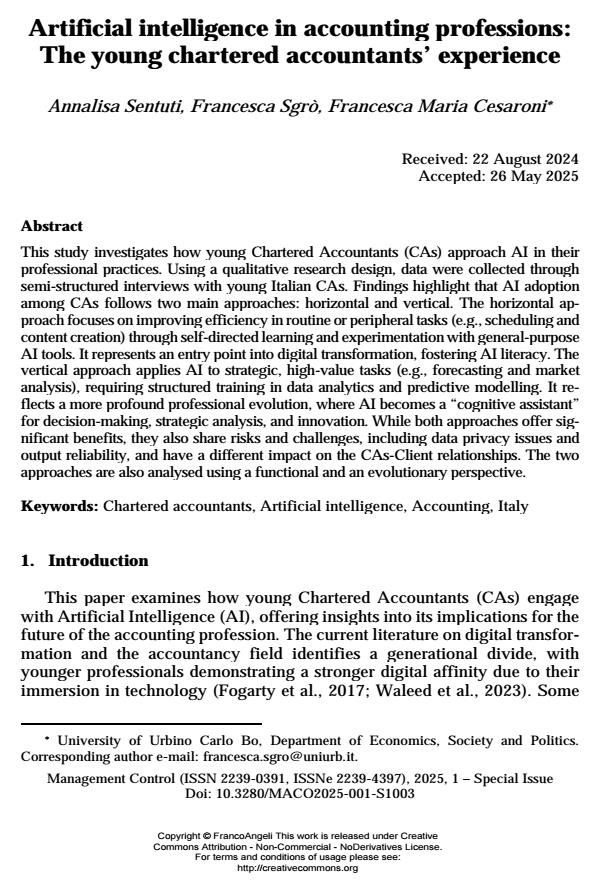Artificial intelligence in accounting professions: The young chartered accountants’ experience
Titolo Rivista MANAGEMENT CONTROL
Autori/Curatori Annalisa Sentuti, Francesca Sgrò, Francesca Maria Cesaroni
Anno di pubblicazione 2025 Fascicolo 2025/1 Suppl.
Lingua Inglese Numero pagine 28 P. 37-64 Dimensione file 185 KB
DOI 10.3280/MACO2025-001-S1003
Il DOI è il codice a barre della proprietà intellettuale: per saperne di più
clicca qui

FrancoAngeli è membro della Publishers International Linking Association, Inc (PILA), associazione indipendente e non profit per facilitare (attraverso i servizi tecnologici implementati da CrossRef.org) l’accesso degli studiosi ai contenuti digitali nelle pubblicazioni professionali e scientifiche.
This study investigates how young Chartered Accountants (CAs) approach AI in their professional practices. Using a qualitative research design, data were collected through semi-structured interviews with young Italian CAs. Findings highlight that AI adoption among CAs follows two main approaches: horizontal and vertical. The horizontal approach focuses on improving efficiency in routine or peripheral tasks (e.g., scheduling and content creation) through self-directed learning and experimentation with general-purpose AI tools. It represents an entry point into digital transformation, fostering AI literacy. The vertical approach applies AI to strategic, high-value tasks (e.g., forecasting and market analysis), requiring structured training in data analytics and predictive modelling. It reflects a more profound professional evolution, where AI becomes a “cognitive assistant” for decision-making, strategic analysis, and innovation. While both approaches offer significant benefits, they also share risks and challenges, including data privacy issues and output reliability, and have a different impact on the CAs-Client relationships. The two approaches are also analysed using a functional and an evolutionary perspective.
Parole chiave:Chartered accountants, Artificial intelligence, Accounting, Italy
Annalisa Sentuti, Francesca Sgrò, Francesca Maria Cesaroni, Artificial intelligence in accounting professions: The young chartered accountants’ experience in "MANAGEMENT CONTROL" 1 Suppl./2025, pp 37-64, DOI: 10.3280/MACO2025-001-S1003